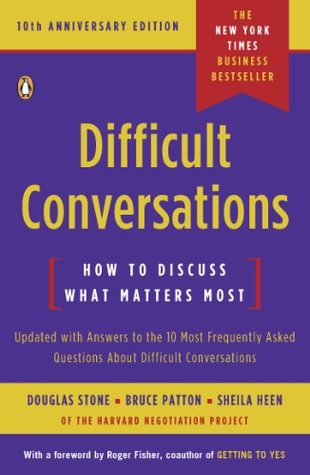More on this book
Community
Kindle Notes & Highlights
Well, no. The point is this: difficult conversations are almost never about getting the facts right. They are about conflicting perceptions, interpretations, and values. They are not about what a contract states, they are about what a contract means. They are not about which child-rearing book is most popular, they are about which child-rearing book we should follow. They are not about what is true, they are about what is important.
allows us to move away from delivering messages and toward asking questions, exploring how each person is making sense of the world. And to offer our views as perceptions, interpretations, and values – not as “the truth.”
What I think about your intentions will affect how I think about you and, ultimately, how our conversation goes. The error we make in the realm of intentions is simple but profound : we assume we know the intentions of others when we don’t. Worse still, when we are unsure about someone’s intentions, we too often decide they are bad.
Talking about blame distracts us from exploring why things went wrong and how we might correct them going forward. Focusing instead on understanding the contribution system allows us to learn about the real causes of the problem, and to work on correcting them. The distinction between blame and contribution may seem subtle.
The problem with this reasoning is that it fails to take account of one simple fact: difficult conversations do not just involve feelings, they are at their very core about feelings. Feelings are not some noisy byproduct of engaging in difficult talk, they are an integral part of the conflict.
There’s only one way to come to understand the other person’s story, and that’s by being curious. Instead of asking yourself, “How can they think that?!” ask yourself, “I wonder what information they have that I don’t?” Instead of asking, “How can they be so irrational?” ask, “How might they see the world such that their view makes sense?” Certainty locks us out of their story; curiosity lets us in.
The And Stance is based on the assumption that the world is complex, that you can feel hurt, angry, and wronged, and they can feel just as hurt, angry, and wronged. They can be doing their best, and you can think that it’s not good enough. You may have done something stupid, and they will have contributed in important ways to the problem as well. You can feel furious with them, and you can also feel love and appreciation for them. The And Stance gives you a place from which to assert the full strength of your views and feelings without having to diminish the views and feelings of someone else.
...more
Mandela does not believe blacks are to blame for their situation. He does believe that blacks must look for and take responsibility for their contribution to the problems of South Africa, if the nation is to move forward successfully. By identifying what you are doing to perpetuate a situation, you learn where you have leverage to affect the system. Simply by changing your own behavior, you gain at least some influence over the problem.


